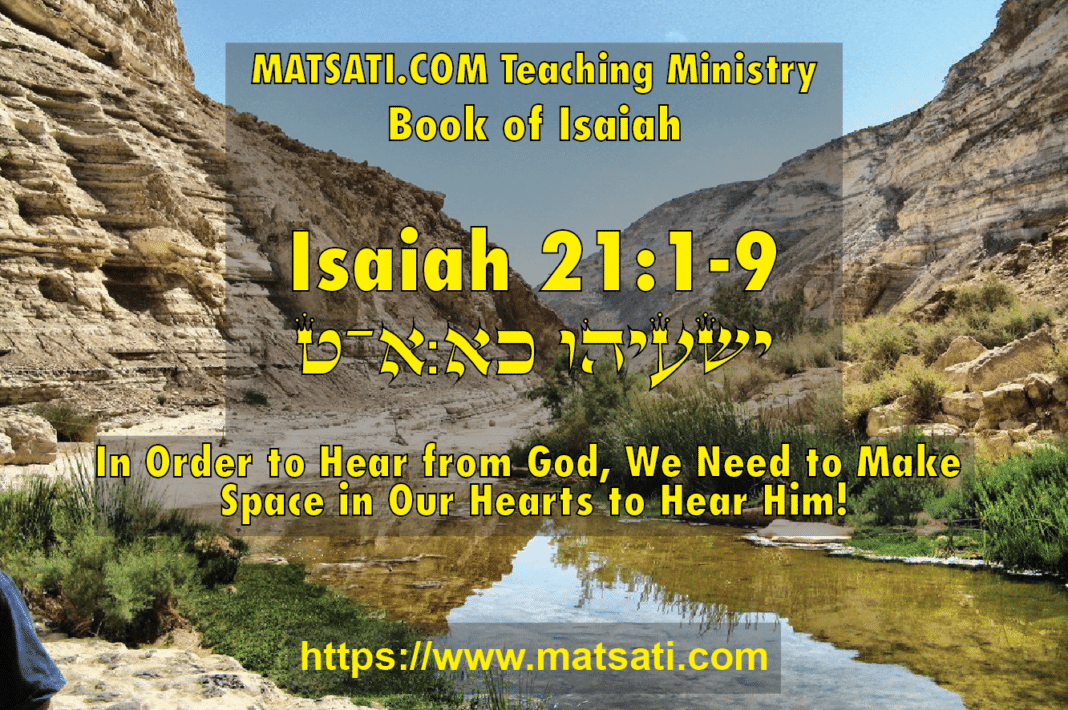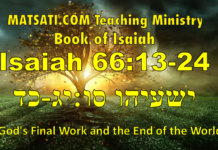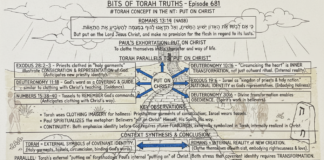Isaiah 21:10-17
One of the difficulties with Isaiah 21 is related to the country or persons to whom it is addressing. Even the interpretation of Isaiah’s message itself is kind of mysterious due to the large distribution of countries that it mentions. In the remainder of chapter 21, Isaiah speaks to Dumah, Arabia, Kedar, and the inhabitants of the land of Tema, etc. In the case of Dumah, John Oswalt writes “Dumah refers to the oasis in northern Arabia known today as Dûmet ej-Jendel. This oasis stood at the intersection of the east-west trade route between the Persian Gulf and Petra and the incense route running northward from the Red Sea to Palmyra. It is about three hundred miles southwest of Jerusalem.” The people of Edom would be greatly concerned with the fall of Dumah (Seir, Bereshit / Genesis 32:3 and 33:14) because this was an eastern trade route for the country. John Oswalt writes that this oracle could apply to both the eighth and the sixth centuries. In the late eighth century, both Sargon and Sennacherib led campaigns into northern Arabia, Sennacherib’s taking him all the way to Dumah. Likewise, in the sixth century the last Babylonian king, Nabonidus, moved his capital to Tema (Isaiah 21:14), and made an effort to bring the Arabian tribes under his control. So, Isaiah’s words could be directed to his contemporaries and yet have larger applicability in the future when God’s trustworthiness and lordship of history would be subjected to an even more severe test.

ספר ישעיה פרק כא
י מְדֻשָׁתִי וּבֶן-גָּרְנִי אֲשֶׁר שָׁמַעְתִּי מֵאֵת יְהֹוָה צְבָאוֹת אֱלֹהֵי יִשְֹרָאֵל הִגַּדְתִּי לָכֶם:
Isaiah 21:10 states, “O my threshing, and the corn of my floor: that which I have heard of the LORD of hosts, the God of Israel, have I declared unto you. (מְדֻשָׁתִי וּבֶן-גָּרְנִי אֲשֶׁר שָׁמַעְתִּי מֵאֵת יְהֹוָה צְבָאוֹת אֱלֹהֵי יִשְֹרָאֵל הִגַּדְתִּי לָכֶם)” So the opening few words state, מְדֻשָׁתִי וּבֶן-גָּרְנִי “my threshing/trampling and son of my threshing floor.” It is interesting the difference from the KJV translation. Comparison with the LXX does not help with determining why the KJV translated the text this way.
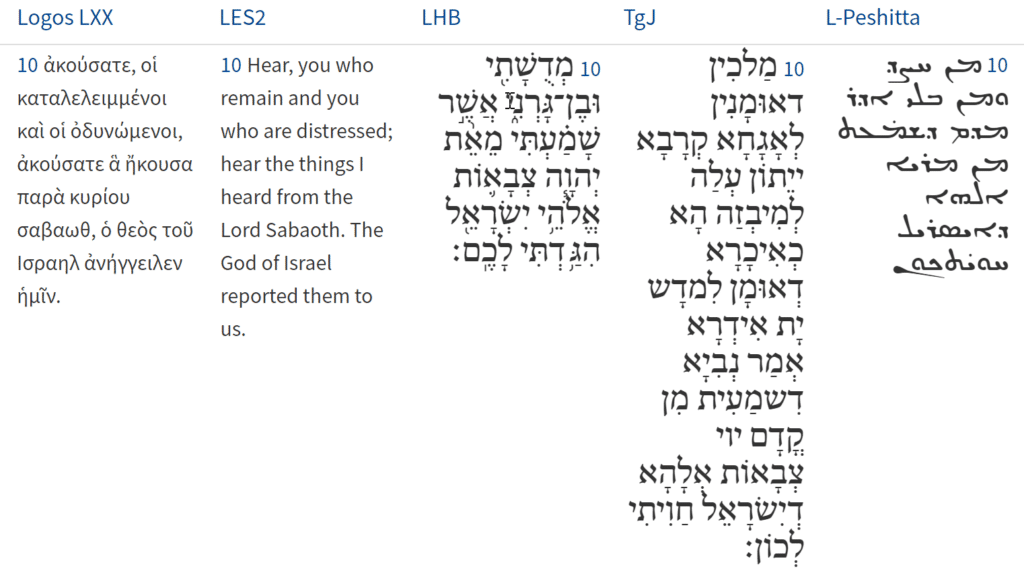
We note the LXX translates ἀκούσατε, οἱ καταλελειμμένοι καὶ οἱ ὀδυνώμενοι, ἀκούσατε ἃ ἤκουσα παρὰ κυρίου σαβαωθ, ὁ θεὸς τοῦ Ισραηλ ἀνήγγειλεν ἡμῖν which means “hear the downtrodden and the distressed, hear I heard from the Lord of hosts the God of Israel reported to us.” The Targum translates “Kings, who are skillful to wage war, shall come against her to plunder her, like a husbandman who is skillful to thrash the floor. The prophet said, The voice of the WORD of the Lord of Hosts, the God of Israel, which I have heard, I have declared unto you.” (TgJ) The L-Peshitta interprets “from reaping and from wearing out of threshing floor heard from the Lord God of Israel Shavuot reported to us.” The idea here is of the treatment of threshing upon the people which is a description of cruelty of the people that is coming. There are many examples of this kind of language according to Isaiah 41:15, Amos 1:3, Micah 4:13, and Habakkuk 3:12. John Oswalt states that this verse can be taken in two ways, if one holds to the prophetic word being for the sixth century, it would be an encouragement for the people in exile since their oppressor will shortly fall. On the other hand, if it is believed this was for those in the eighth century, then this could be considered one of regret from the sense of hoping of having relief from Assyria, then Babylon comes to do further threshing upon the people. This verse draws on the idea of threshing the people, which is a description of how one crushes the kernel of grain and the wind blows away the chaff. The Scriptures also describe how animals were used in this process as well according to Isaiah 28:27-28, 41:15-16, Amos 1:3, and Micah 4:13. The Lord is speaking to Isaiah of the people being trampled down due to their unrepentant sins, and how the Lord is the one who is declaring these things. The Lord God is bringing these disasters for the purpose of waking up the population to the reality of His presence and Lordship over all!
ספר ישעיה פרק כא
יא מַשָּׂא דּוּמָה אֵלַי קֹרֵא מִשֵּׂעִיר שֹׁמֵר מַה-מִּלַּיְלָה שֹׁמֵר מַה-מִּלֵּיל:
Isaiah 21:11 states, “The burden of Dumah. He calleth to me out of Seir, Watchman, what of the night? Watchman, what of the night? (מַשָּׂא דּוּמָה אֵלַי קֹרֵא מִשֵּׂעִיר שֹׁמֵר מַה-מִּלַּיְלָה שֹׁמֵר מַה-מִּלֵּיל)” Again we find the use of this word מַשָּׂא which is translated as “burden” and in the more modern translations say this is translated as “oracle.” This oracle of Dumah, Isaiah calls out using the word שֹׁמֵר. This is interesting since שֹׁמֵר means “guard/watch/keep” and from a Torah perspective relates to guarding one’s life with the commands of God. Note what we read according to Shemot / Exodus 15:26.

ספר שמות פרק טו
כו וַיֹּאמֶר אִם-שָׁמוֹעַ תִּשְׁמַע לְקוֹל | יְהוָֹה אֱלֹהֶיךָ וְהַיָּשָׁר בְּעֵינָיו תַּעֲשֶֹה וְהַאֲזַנְתָּ לְמִצְוֹתָיו וְשָׁמַרְתָּ כָּל-חֻקָּיו כָּל-הַמַּחֲלָה אֲשֶׁר-שַֹמְתִּי בְמִצְרַיִם לֹא-אָשִֹים עָלֶיךָ כִּי אֲנִי יְהוָֹה רֹפְאֶךָ:
Shemot / Exodus 15:26
15:26 And said, If thou wilt diligently hearken to the voice of the LORD thy God, and wilt do that which is right in his sight, and wilt give ear to his commandments, and keep all his statutes, I will put none of these diseases upon thee, which I have brought upon the Egyptians: for I am the LORD that healeth thee. (KJV)
This is from the Torah portion Beshalach and there are several aspects of this verse that need careful consideration. Moshe writes אִם-שָׁמוֹעַ תִּשְׁמַע לְקוֹל | יְהוָֹה אֱלֹהֶיךָ “if you diligently listen to the voice of the Lord your God” which recalls the voice of God on the mountain of Sinai and the Shema on the command to love the Lord with all your heart, soul, and might. The Midrash describes in this way:
Shir HaShirim Rabbah 5:16:3
That is what is written: “If we continue to hear [the voice of the Lord our God we shall die]” . That is what is written: “My soul departed when he spoke” ….At that moment, the Holy One blessed be He then sweetened the spoken word for them. That is what is written: “The voice of the Lord is mighty; the voice of the Lord is majestic” ….Rabbi Ḥama bar Rabbi Ḥanina said: “The voice of the Lord is mighty” – for the lads; “the voice of the Lord is majestic” – for the elderly.
This idea of the voice of God, of שָׁמוֹעַ תִּשְׁמַע לְקוֹל diligently listening to the voice, requires humility and humbling of heart. This means that in order to hear from God we need to make space in our hearts to hear Him! The next part וְהַיָּשָׁר בְּעֵינָיו תַּעֲשֶֹה “do what is right in his eyes,” we live in such a sinful world sometimes it is difficult to make the right decision and do what is right. This is why we are being called to cleave unto God and to His word. The word וְהַיָּשָׁר is an adjective and describes what is proper or the correct path. The Torah teaches us that God is tov v’yasher meaning that He is good and upright. This teaches us that we too must be יְשָׁרִים (upright) who walk according to His ways. (Tehillim / Psalms 25:8, טוֹב־וְיָשָׁ֥ר יְהוָ֑ה עַל־כֵּ֤ן יוֹרֶ֖ה חַטָּאִ֣ים בַּדָּֽרֶךְ׃, χρηστὸς καὶ εὐθὴς ὁ κύριος, διὰ τοῦτο νομοθετήσει ἁμαρτάνοντας ἐν ὁδῷ.) The LXX writes χρηστὸς καὶ εὐθὴς ὁ κύριος “good and righteous is the Lord.” Moshe goes on saying וְהַאֲזַנְתָּ לְמִצְוֹתָיו וְשָׁמַרְתָּ כָּל-חֻקָּיו “and listen to His commands and keep His statutes.” The text literally says וְהַאֲזַנְתָּ a hifil verb meaning one is to use one’s ears to actually listen to the God’s commands. This involves actively listening and not passively listening. This connects us to the first part of the verse on actually heeding שָׁמוֹעַ תִּשְׁמַע the voice of God. The reason is serious because Moshe says כָּל-הַמַּחֲלָה אֲשֶׁר-שַֹמְתִּי בְמִצְרַיִם לֹא-אָשִֹים עָלֶיךָ כִּי אֲנִי יְהוָֹה רֹפְאֶךָ “all the diseases that I placed on Egypt I will not place upon you because I am the Lord who heals you.” According to Yeshua the יְשָׁרִים are known by their fruit (Matthew 7:15-23). The Mekhilta, a halakhic midrash to Exodus associates “doing what is right” with making God-honoring choices in our daily lives. (1 Corinthians 10:31) Just as James wrote in James 1:22.
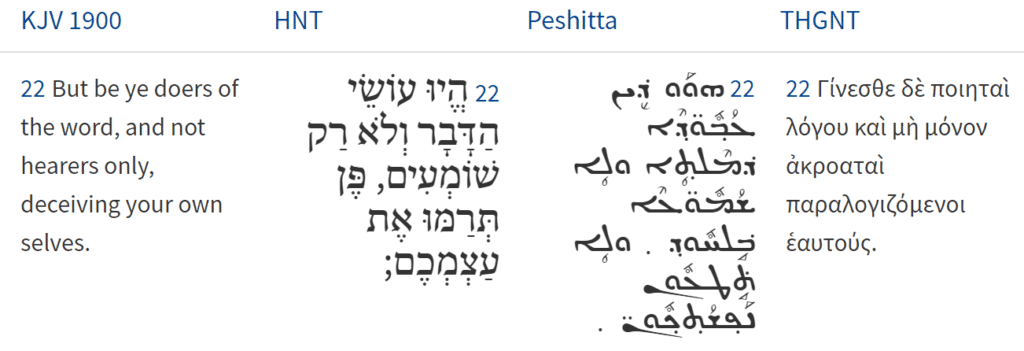
James says according to the Peshitta ܗܘܰܘ ܕܷ݁ܝܢ ܥܳܒ݂ܽܘ̈ܕ݂ܶܐ ܕ݁ܡܶܠܬ݂ܴܐ “be a doer of the word” we note the word ܥܳܒ݂ܽܘ̈ܕ݂ܶܐ is written in the emphatic peal noun meaning that we are to be a maker, or creator of the deed. This has significant implications as we function in b’tzelem Elohim (in the image of God) creating a good work that lines up with the word of God. Note that we are creators, we create or make something when we obey God’s commands, His statutes, His judgments in our lives. This is something that has not been given to the animal kingdom. James says that we are to be creators and not just hearers only meaning our actions are not coupled with what we hear. James then states ܘܠܴܐ ܬܱ݁ܛܥܽܘܢ ܢܰܦ݂ܫܳܬ݂ܟ݂ܽܘܢ̈ “do not delude yourself.” We note the Greek NT writes literally saying “reason around” the truth, παραλογιζόμενοι a verb middle or passive participle from παρά meaning “around, beside” the truth concerning God’s word. What James is focusing upon is זאת חֻקַּת הַתּוֹרָה (this is the decree of the Torah) which is a statement of finality that what God has said we are to do. Note that a חֻקַּת is something that comes without explanation and so this can quickly lead to one ܬܱ݁ܛܥܽܘܢ / παραλογιζόμενοι “deluding” oneself reasoning around keeping what God has said. To shomar something is to carefully guard, and this is what is being applied to God’s holy words that we are to guard these truths in our hearts.
We note that Isaiah states Isaiah 21:11 states, “The burden of Dumah. He calleth to me out of Seir, Watchman, what of the night? Watchman, what of the night? (מַשָּׂא דּוּמָה אֵלַי קֹרֵא מִשֵּׂעִיר שֹׁמֵר מַה-מִּלַּיְלָה שֹׁמֵר מַה-מִּלֵּיל)” Isaiah is speaking of the שֹׁמֵר the guard who stands and watches the horizon to announce to those who sleep of the coming of the enemy. The emphasis here seems to draw a Torah based parallel to obedience. The Mishnah states: “It is not the explanation that is essential, but the deed itself.” This is the point of the oracle that the reason these things are happening are due to the people’s sins, and this is the emphasis of these scriptures from Shemot / Exodus, James, and Isaiah. Note how these things are consistent with Yeshua’s words when he said, “Not everyone who says to me, ‘Lord, Lord,’ will enter the kingdom of heaven, but the one who does the will of my Father who is in heaven. On that day many will say to me, ‘Lord, Lord, did we not prophesy in your name, and cast out demons in your name, and do many mighty works in your name?’ And then will I declare to them, ‘I never knew you; depart from me, you workers of lawlessness” (Matt. 7:21-23). We note that Simchat Torah (the joy of Torah) is the reason there is the blessing that states “Blessed are You, Lord our God… who sanctifies us with His commandments…” The reason being is the giving of the commandments is a gift that enables us to walk in the righteousness of life (see 1 John 2:29). The joy of the commands is found in our opportunities to be makers of the word for the glory of God our Father in heaven!
ספר ישעיה פרק כא
יב אָמַר שֹׁמֵר אָתָא בֹקֶר וְגַם-לָיְלָה אִם-תִּבְעָיוּן בְּעָיוּ שֻׁבוּ אֵתָיוּ:
Isaiah 21:12 states, “The watchman said, The morning cometh, and also the night: if ye will enquire, enquire ye: return, come. (אָמַר שֹׁמֵר אָתָא בֹקֶר וְגַם-לָיְלָה אִם-תִּבְעָיוּן בְּעָיוּ שֻׁבוּ אֵתָיוּ)” Here Isaiah speaks for the watchman saying אָתָא בֹקֶר וְגַם-לָיְלָה “the morning comes and also the night” suggesting that while it is night the morning will come which provides hopeful expectation of the day, or of the hopefulness in the repetition of morning and nighttime. This interpretation speaks to something that Yeshua said according to John 8:12.
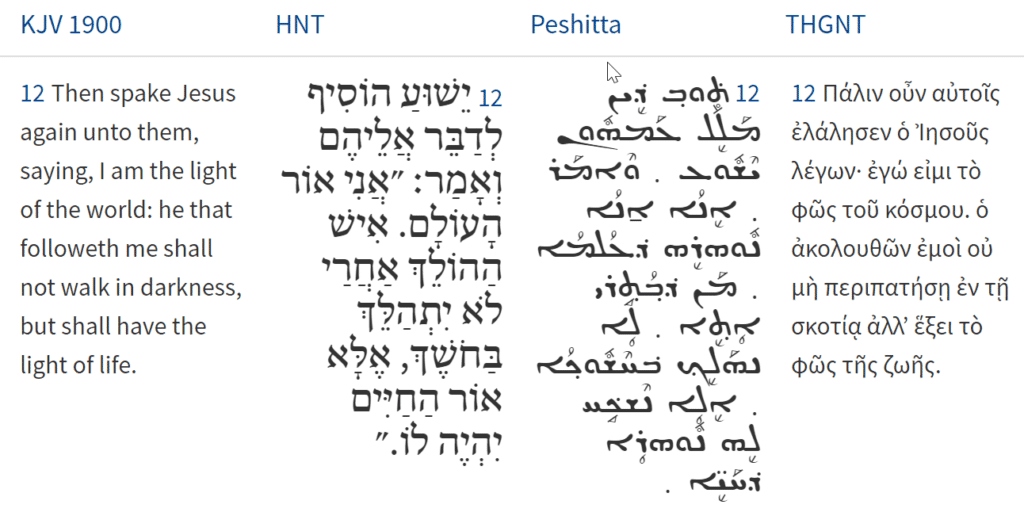
Here Yeshua says ἐγώ εἰμι τὸ φῶς τοῦ κόσμου “I am the light of the world.” (John 8:12 ( ܐܷܢܳܐ ܐ̱ܢܳܐ ܢܽܘܗܪܷܗ ܕ݁ܥܳܠܡܳܐ) What we note about the Isaiah text saying אָתָא בֹקֶר וְגַם-לָיְלָה speaks to this from the sense that one stumbles in the darkness and when the light comes one is able to walk correctly without stumbling. Yeshua says John 8:12 (Peshitta): ܡܰܢ ܕ݁ܒ݂ܳܬ݂ܱܪܝ ܐܴܬ݂ܷܐ ܂ ܠܴܐ ܢܗܰܠܷܟ݂ ܒ݁ܚܶܫܽܘܟ݂ܳܐ “he who follows me will not walk in darkness.” The Greek NT goes on saying ὁ ἀκολουθῶν ἐμοὶ οὐ μὴ περιπατήσῃ ἐν τῇ σκοτίᾳ ἀλλʼ ἕξει τὸ φῶς τῆς ζωῆς using an aroist active subjunctive verb περιπατήσῃ is literally describing one who walks after him as “the one who lives” is a continuous action on behalf of the one who follows Yeshua. This involves turning from sin Teshuvah (repentance) which draws us back to the Isaiah text which writes שֻׁבוּ אֵתָיוּ “turn and come.” The turning provides these overtones of repentance which is the motivation for Isaiah’s oracle to these nations. The prophetic message being given here is a little unclear on the exact intended message, but this might be for this very specific reason, so we dig into the Word of God and find these connections to repentance and return which provides a hope of the future, if we truly trust in the Lord God Almighty in every way!
ספר ישעיה פרק כא
יג מַשָּׂא בַּעְרָב בַּיַּעַר בַּעְרַב תָּלִינוּ אֹרְחוֹת דְּדָנִים:
Isaiah 21:13 states, “The burden upon Arabia. In the forest in Arabia shall ye lodge, O ye traveling companies of Dedanim. (מַשָּׂא בַּעְרָב בַּיַּעַר בַּעְרַב תָּלִינוּ אֹרְחוֹת דְּדָנִים)” Here Isaiah addresses another group of people who are allies with Babylon. In context, these places Tema, Dedan, and Kedar, they are all locations in Arabia, so there is high likelihood that Isaiah is speaking of Arabia in general. John Oswalt writes “Tema is about two hundred miles southeast of Dumah on the incense trade route, while Dedan is probably to be identified with modern al-Ula, which is another ninety miles southeast of Tema. Both these sites are located in the region known as Kedar (Isaiah 42:11, 60:7, Bereshit / Genesis 25:13, Tehillim / Psalms 120:5, Jeremiah 2:10, 49:28, Ezekirl 27:21) in the northwestern part of the Arabian desert.” This phrase תָּלִ֔ינוּ אֹֽרְח֖וֹת דְּדָנִֽים “lodging companies of didanim” may simply be those people’s fleeing the army of Babylon (refugees). The identity of these people is not established by Isaiah which makes sense per the times of war.
ספר ישעיה פרק כא
יד לִקְרַאת צָמֵא הֵתָיוּ מָיִם יֹשְׁבֵי אֶרֶץ תֵּימָא בְּלַחְמוֹ קִדְּמוּ נֹדֵד: טו כִּי-מִפְּנֵי חֲרָבוֹת נָדָדוּ מִפְּנֵי | חֶרֶב נְטוּשָׁה וּמִפְּנֵי קֶשֶׁת דְּרוּכָה וּמִפְּנֵי כֹּבֶד מִלְחָמָה:
Isaiah 21:14 states, “The inhabitants of the land of Tema brought water to him that was thirsty, they prevented with their bread him that fled. (לִקְרַאת צָמֵא הֵתָיוּ מָיִם יֹשְׁבֵי אֶרֶץ תֵּימָא בְּלַחְמוֹ קִדְּמוּ נֹדֵד)” Isaiah 21:15 “For they fled from the swords, (כִּי-מִפְּנֵי חֲרָבוֹת נָדָדוּ) from the drawn sword, and from the bent bow, and from the grievousness of war. (מִפְּנֵי | חֶרֶב נְטוּשָׁה וּמִפְּנֵי קֶשֶׁת דְּרוּכָה וּמִפְּנֵי כֹּבֶד מִלְחָמָה)” It is interesting the way the KJV translates לִקְרַאת צָמֵא הֵתָיוּ מָיִם יֹשְׁבֵי אֶרֶץ תֵּימָא בְּלַחְמוֹ קִדְּמוּ נֹדֵד saying that “The inhabitants of the land of Tema brought water to him that was thirsty, they prevented with their bread him that fled.”
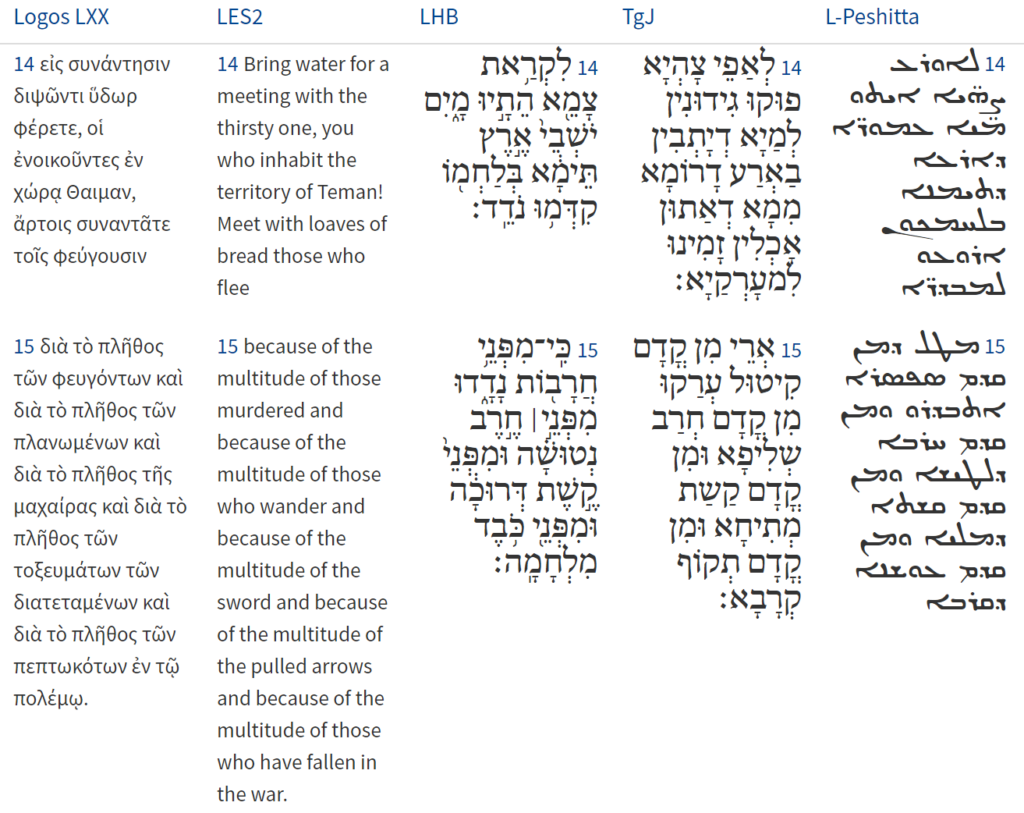
We note that bread is mentioned in the LXX: ἄρτοις which is the Hebrew equivalent of לחם for “Bread.” The TgJ translates saying “Bring bottles of water before the thirsty, who dwell in land of the south; prepare for the fugitives the daily food which ye eat.” The idea is that this drink and food was for the refugee who were fleeing war. Isaiah 21:15 states this explicitly saying, כִּי-מִפְּנֵי חֲרָבוֹת נָדָדוּ מִפְּנֵי | חֶרֶב נְטוּשָׁה וּמִפְּנֵי קֶשֶׁת דְּרוּכָה וּמִפְּנֵי כֹּבֶד מִלְחָמָה “For they fled from the swords, from the drawn sword, and from the bent bow, and from the grievousness of war.” War time causes people to flee, this happened during the various war campaigns such as Tiglath-pileser III, 738 BC, Sargon II, 715 BC, and Sennacherib, 703 and 689 BC. This phrase כִּי-מִפְּנֵי חֲרָבוֹת נָדָדוּ “from before the swords they flee” the word swords חֲרָבוֹת is written in the plural form and draws in the idea of many soldiers coming in battle against the land. Arabia is a pretty vast and harsh desert-like region in which these people are fleeing. Note how the LXX expands upon the MSS speaking of the multitude (πλῆθος) of those who wander and the multitude (πλῆθος) of the sword and pulled arrows and those who have fallen.
ספר ישעיה פרק כא
טז כִּי-כֹה אָמַר אֲדֹנָי אֵלָי בְּעוֹד שָׁנָה כִּשְׁנֵי שָֹכִיר וְכָלָה כָּל-כְּבוֹד קֵדָר: יז וּשְׁאָר מִסְפַּר-קֶשֶׁת גִּבּוֹרֵי בְנֵי-קֵדָר יִמְעָטוּ כִּי יְהֹוָה אֱלֹהֵי-יִשְֹרָאֵל דִּבֵּר:
Isaiah 21:16 states, “For thus hath the LORD said unto me, Within a year, according to the years of an hireling, and all the glory of Kedar shall fail: (כִּי-כֹה אָמַר אֲדֹנָי אֵלָי בְּעוֹד שָׁנָה כִּשְׁנֵי שָֹכִיר וְכָלָה כָּל-כְּבוֹד קֵדָר)” Isaiah 21:17 “And the residue of the number of archers, the mighty men of the children of Kedar, shall be diminished: for the LORD God of Israel hath spoken it. (וּשְׁאָר מִסְפַּר-קֶשֶׁת גִּבּוֹרֵי בְנֵי-קֵדָר יִמְעָטוּ כִּי יְהֹוָה אֱלֹהֵי-יִשְֹרָאֵל דִּבֵּר)” The Lord concludes with the glory of Kedar falling. We note that KEDAR (קֵדָר) is located in the northern portion of Arabia, occupied by the nomadic descendants of Ishmael (see Tehillim / Psalms 120:5, Song 1:5, Isaiah 21:16-17, 42:11, 60:7, Jeremiah 2:10, 49:28, Ezekiel 27:21). When we consider the falling of Kedar, we note that the glory of God is the only one whom will remain forever. When we take a step back considering the nations and look at the overall picture, we remember the Torah perspective from the sense that God delivered a mixed multitude from Egypt. What this speaks to us about is how the Lord God Almighty is concerned for all men, regardless of nation or people. These nations, Babylon, Edom, Arabia, have their gods they worship, and the Lord God Almighty is trying to call out to them to turn from their sinful ways and turn to Him who is the author of Life and Truth! The prophet Isaiah is led by God to speak to these nations for this specific purpose, in the hopes of turning them from sin. We note this is the righteousness and grace of God for all peoples, which is consistent with the NT account of the gospel message presented by Yeshua and the Disciples, and especially Paul! The sovereignty of God over all people naturally leads to this outcome, and provides a great hope for all people, it doesn’t matter the nationality or what one has done in the past, simply repent, seek the God of Israel, and believe in Yeshua the Messiah for the forgiveness of Sins! All of these things provide us with this specific future expectation, of the hope and life that we can have in the Messiah for the purpose of relationship with God and a life that is filled with peace and joy!
Rabbinic Commentary
The Targum Jonathan is an Aramaic and Rabbinic translation of the book of Isaiah and is therefore a valuable resource for us to study while we study the book of Isaiah.
תרגום יונתן בן עוזיאל אל ישעיה פרק כא:י-יז
י מַלכִין דאוּמָנִין לְאָגָחָא קְרָבָא ייֵתֹון עְלַה לְמִיבְזַה הָא כְאִיכָרָא דְאוּמָן לִמדָש יָת אִידְרָא אְמַר נְבִיָא דִשמַעִית מִן קֳדָם יוי צְבָאֹות אְלָהָא דְיִשׂרָאֵל חַוִיתִי לְכֹון׃ יא מַטַל כָס דִלוָט לְאַשקָאָה יָת דוּמָה עְלַי אַכלִי מִן שְמַיָא נְבִיָא פָרֵיש לְהֹון יָת נְבוּאְתָא נְבִייָא פָרֵיש לְהֹון מָא דַעְתִיד לְמֵיתֵי׃ יב אְמַר נְבִיָא אִית אְגַר לְצַדִיקַיָא וְאִית פֹורעָנוּ לְרַשִיעַיָא אִם תָיְבִין אַתוּן תוּבוּ עַד דְאַתוּן יָכְלִין לִמתָב׃ יג מַטַל כָס דִלוָט לְאַשקָאָה יָת עַרבָאֵי בְחוּרשָא בְרַמשָא יְבִיתוּן שְיָרַת בְנֵי דְדָן׃ יד לְאַפֵי צָהְיָא פוּקוּ גִידוּנִין לְמַיָא דְיָתְבִין בַאְרַע דָרֹומָא מִמָא דְאַתוּן אָכְלִין זָמִינוּ לִמעָרְקַיָא׃ טו אְרֵי מִן קֳדָם קִיטוּל עְרַקוּ מִן קֳדָם חְרַב שְלִיפָא וּמִן קֳדָם קַשַת מְתִיחָא וּמִן קֳדָם תְקֹוף קְרָבָא׃ טז אְרֵי כִדנָן אְמַר יוי לִי בְסֹוף שְנַיָא כִשנֵי אְגִירָא וִיסוּף כָל יְקָרְהֹון דעַרבָאֵי׃ יז וּשאָר תְקֹוף עָבְדֵי קְרָב גִיבָרֵי בְנֵי עַרבָאֵי יַזעְרוּן אְרֵי בְמֵימְרָא דַיוי אְלָהָא דְיִשׂרָאֵל גְזִיר כֵין׃
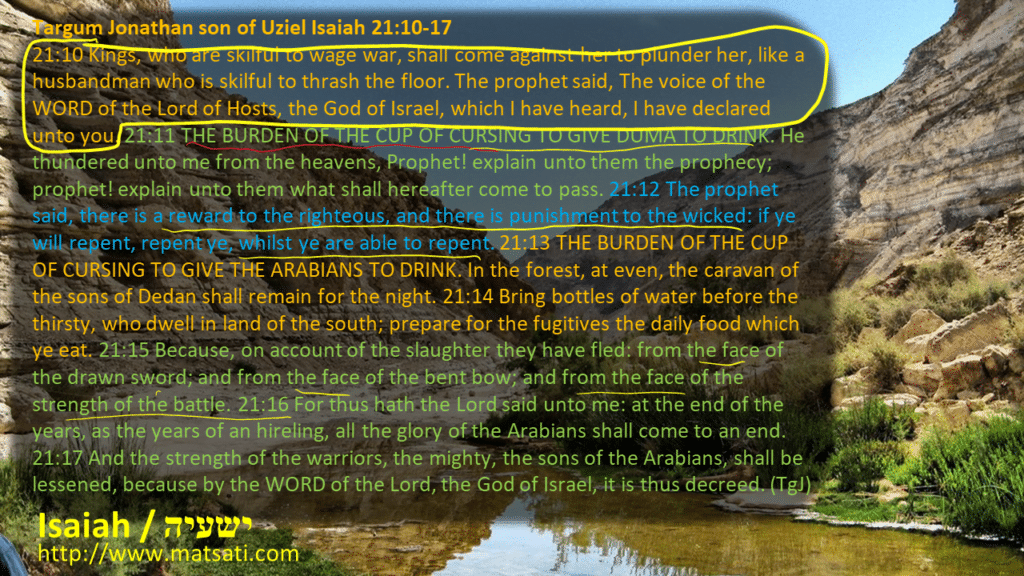
Targum Jonathan son of Uziel Isaiah 21:10-17
21:10 Kings, who are skilful to wage war, shall come against her to plunder her, like a husbandman who is skilful to thrash the floor. The prophet said, The voice of the WORD of the Lord of Hosts, the God of Israel, which I have heard, I have declared unto you. 21:11 THE BURDEN OF THE CUP OF CURSING TO GIVE DUMA TO DRINK. He thundered unto me from the heavens, Prophet! explain unto them the prophecy; prophet! explain unto them what shall hereafter come to pass. 21:12 The prophet said, there is a reward to the righteous, and there is punishment to the wicked: if ye will repent, repent ye, whilst ye are able to repent. 21:13 THE BURDEN OF THE CUP OF CURSING TO GIVE THE ARABIANS TO DRINK. In the forest, at even, the caravan of the sons of Dedan shall remain for the night. 21:14 Bring bottles of water before the thirsty, who dwell in land of the south; prepare for the fugitives the daily food which ye eat. 21:15 Because, on account of the slaughter they have fled: from the face of the drawn sword; and from the face of the bent bow; and from the face of the strength of the battle. 21:16 For thus hath the Lord said unto me: at the end of the years, as the years of an hireling, all the glory of the Arabians shall come to an end. 21:17 And the strength of the warriors, the mighty, the sons of the Arabians, shall be lessened, because by the WORD of the Lord, the God of Israel, it is thus decreed. (TgJ)
The TgJ opens saying, י מַלכִין דאוּמָנִין לְאָגָחָא קְרָבָא ייֵתֹון עְלַה לְמִיבְזַה הָא כְאִיכָרָא דְאוּמָן לִמדָש יָת אִידְרָא אְמַר נְבִיָא דִשמַעִית מִן קֳדָם יוי צְבָאֹות אְלָהָא דְיִשׂרָאֵל חַוִיתִי לְכֹון׃ 21:10 Kings, who are skilful to wage war, shall come against her to plunder her, like a husbandman who is skilful to thrash the floor. The prophet said, The voice of the WORD of the Lord of Hosts, the God of Israel, which I have heard, I have declared unto you. (TgJ) We note again about the threshing floor how the one working the threshing floor beats the grain in order to separate the chaff from the grain kernel. The idea is to separate the two, to remove the useless part and to then use that which is useful. This reminds us of something similar, such as the refiner’s fire to purify precious metals. We are told the Lord does this for the purpose of helping us to grow and to leave our sinful ways.
Midrash Tanchuma Buber, Bamidbar 22:3 states the following concerning this verse.
Midrash Tanchuma Buber, Bamidbar 22:3
[Another interpretation (of Is. 43:4): BECAUSE YOU ARE PRECIOUS IN MY EYES, YOU ARE HONORED.] The Holy One said: You are precious in my eyes, because to all the those nations I gave no numbering (minyan), but to you I did give a numbering. It is comparable to a king of flesh and blood who had a lot of granaries, but all of them were dirty and full of darnel; so he was not meticulous about numbering. however, this granary beautiful wheat. I therefore want to be meticulous in numbering how many kors123One kor is equivalent to somewhat under 400 liters. there are, how many sacks there are in it, how many measures there are in it. Similarly this king is the Supreme King of Kings, the Holy One; and this granary (goren) is Israel, since it is stated (in Is. 21:10): MY THRESHING, AND THE PRODUCT (literally: THE CHILD) OF MY THRESHING FLOOR (goren). It also says (in Jer. 2:3): ISRAEL IS THE LORD’S SANCTUARY, [THE BEGINNING OF HIS HARVEST]. The child of his house is Moses, as stated (in Numb. 12:7): NOT SO WITH MY SERVANT MOSES; [HE IS TRUSTED IN ALL MY HOUSE]. The Holy One said to him: The nations are comparable to thorns, as stated (in Is. 33:12): AND THE PEOPLES SHALL BECOME BURNINGS OF LIME, THORNS CUT DOWN . Therefore, you shall not be meticulous about numbering them, but Israel is righteous, as stated (in Is. 60:21): AND ALL OF YOUR PEOPLE ARE RIGHTEOUS. It also says (in Cant. 4:7): YOU ARE BEAUTIFUL ALL OVER, MY BELOVED, [AND THERE IS NO BLEMISH IN YOU]. Therefore, be meticulous in counting Israel. Moses did so. He numbered them how many kors there were, as stated (in Numb. 1:2): TAKE A CENSUS….; how many sacks there were, as stated (in Numb. 2:4): HIS HOST AND THOSE OF THEM ENROLLED; and how many measures there were, as stated (in Numb. 3:40): ENROLL EVERY FIRST-BORN MALE.
The rabbis speak of the threshing, beating, crushing, or trampling grain to separate the edible portions from chaff (Judges 6:11, Ruth 3:2, Jeremiah 51:33, Isaiah 41:15) and parallel this to the children of Israel. This is derived starting with the text in Isaiah 21:10 literally stating, וּבֶן־גָּרְנִ֑י “the children of my threshing.” A parable is spoken that describes a king who is not meticulous about numbering the amount of grain that he has. There was however one silo of grain that he loved (it was beautiful) and so he was meticulous for numbering the amount of grain in this particular case. The idea of some of the grain containing darnel is that of the nations. And the beautiful grain is that of Israel, of God’s people, those who have faith and are faithful to Him! This draws on the concept of the harvest of souls and reminds us of the NT descriptions of the phrase “fishers of men” spoken by Yeshua when He was calling two of His disciples, Simon Peter and Andrew, to follow Him.
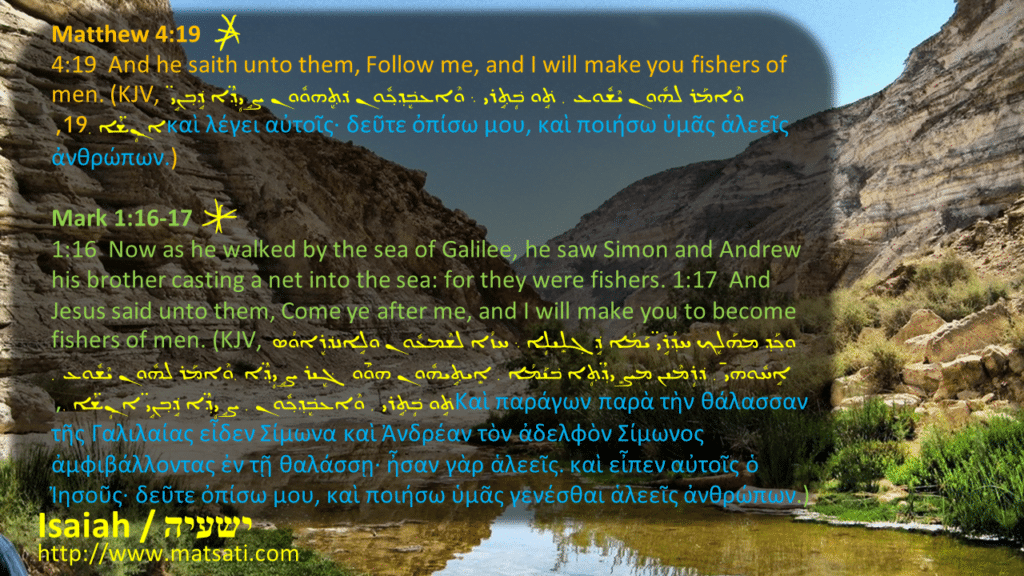
Matthew 4:19
4:19 And he saith unto them, Follow me, and I will make you fishers of men. (KJV, ܘܶܐܡܰܪ ܠܗܽܘܢ ܝܶܫܽܘܥ ܂ ܬܱ݁ܘ ܒܴ݁ܬ݂ܱܪܝ ܆ ܘܶܐܥܒܷ݁ܕ݂ܟ݂ܽܘܢ ܕ݁ܬ݂ܷܗܘܽܘܢ ܨܱܝܴ̈ܕ݂ܶܐ ܕܱ݁ܒ݂ܢܱ̈ܝ ܐ̱ܢܴ̈ܫܳܐ ܂19, καὶ λέγει αὐτοῖς· δεῦτε ὀπίσω μου, καὶ ποιήσω ὑμᾶς ἁλεεῖς ἀνθρώπων.)
Mark 1:16-17
1:16 Now as he walked by the sea of Galilee, he saw Simon and Andrew his brother casting a net into the sea: for they were fishers. 1:17 And Jesus said unto them, Come ye after me, and I will make you to become fishers of men. (KJV, ܘܟ݂ܰܕ݂ ܡܗܰܠܷܟ݂ ܚܕ݂ܳܪܱ̈ܝ ܝܰܡܳܐ ܕܱ݁ܓ݂ܠܻܝܠܴܐ ܆ ܚܙܳܐ ܠܫܶܡܥܽܘܢ ܘܠܱܐܢܕ݁ܪܷܐܘܳܣ ܐܱܚܽܘܗ̄ܝ ܂ ܕ݁ܪܴܡܶܝܢ ܡܨܻܝ̈ܕ݂ܳܬ݂ܴܐ ܒ݁ܝܰܡܳܐ ܂ ܐܻܝܬ݂ܱܝܗܽܘܢ ܗ̄ܘܰܘ ܓܷ݁ܝܪ ܨܱܝܴ̈ܕ݂ܶܐ ܂ܘܶܐܡܰܪ ܠܗܽܘܢ ܝܶܫܽܘܥ ܂ ܬܱ݁ܘ ܒܴ݁ܬ݂ܱܪܝ ܂ ܘܶܐܥܒܷ݁ܕ݂ܟ݂ܽܘܢ ܂ ܨܱܝܴ̈ܕ݂ܶܐ ܕܱ݁ܒ݂ܢܱ̈ܝ ܐ̱ܢܴ̈ܫܳܐ ܂, Καὶ παράγων παρὰ τὴν θάλασσαν τῆς Γαλιλαίας εἶδεν Σίμωνα καὶ Ἀνδρέαν τὸν ἀδελφὸν Σίμωνος ἀμφιβάλλοντας ἐν τῇ θαλάσσῃ· ἦσαν γὰρ ἁλεεῖς. καὶ εἶπεν αὐτοῖς ὁ Ἰησοῦς· δεῦτε ὀπίσω μου, καὶ ποιήσω ὑμᾶς γενέσθαι ἁλεεῖς ἀνθρώπων.)
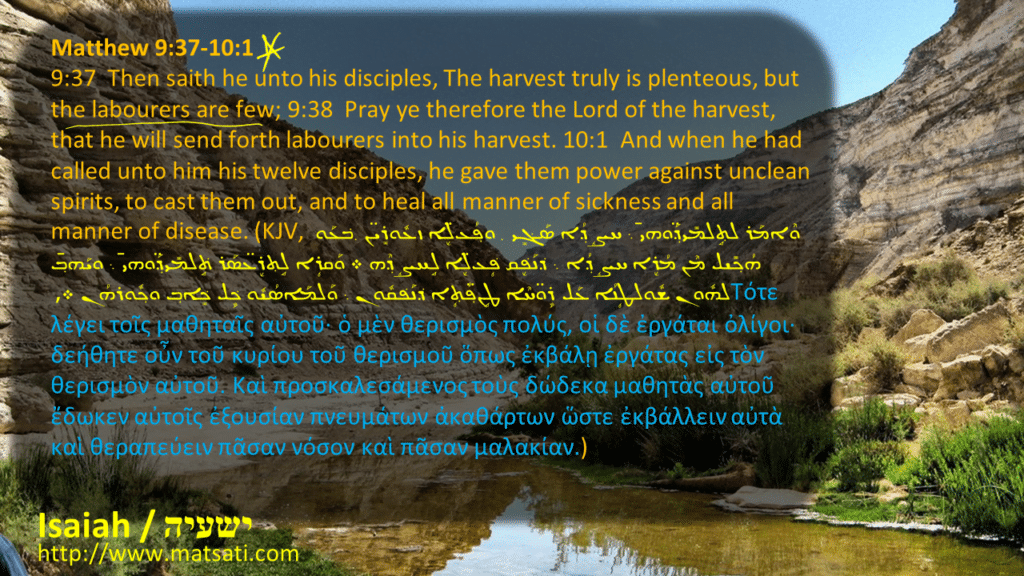
Matthew 9:37-10:1
9:37 Then saith he unto his disciples, The harvest truly is plenteous, but the labourers are few; 9:38 Pray ye therefore the Lord of the harvest, that he will send forth labourers into his harvest. 10:1 And when he had called unto him his twelve disciples, he gave them power against unclean spirits, to cast them out, and to heal all manner of sickness and all manner of disease. (KJV, ܘܶܐܡܰܪ ܠܬ݂ܱܠܡܺܝ̈ܕ݂ܰܘܗ̄ܝ ܆ ܚܨܴܕ݂ܳܐ ܣܰܓܻ݁ܝ ܂ ܘܦ݂ܳܥ̈ܠܷܐ ܙܥܽܘܪܻ̈ܝܢ ܂ܒ݁ܥܰܘ ܗܳܟ݂ܺܝܠ ܡܶܢ ܡܳܪܷܐ ܚܨܴܕ݂ܳܐ ܆ ܕ݁ܢܰܦܷ݁ܩ ܦܴ݁ܥ̈ܠܷܐ ܠܱܚܨܴܕ݂ܶܗ ܀ ܘܰܩܪܴܐ ܠܱܬ݂ܪܷ̈ܥܣܰܪ ܬܱ݁ܠܡܺܝ̈ܕ݂ܰܘܗ̄ܝ ܆ ܘܝܰܗ̄ܒ݂ ܠܗܽܘܢ ܫܽܘܠܛܴܢܳܐ ܥܰܠ ܪܾ̈ܘܚܶܐ ܛܱܢ̈ܦ݂ܳܬ݂ܴܐ ܕ݁ܢܰܦ݁ܩܽܘܢ ܆ ܘܰܠܡܰܐܣܳܝܽܘ ܟܾ݁ܠ ܟܻ݁ܐܒ݂ ܘܟ݂ܽܘܪܗܳܢ ܀, Τότε λέγει τοῖς μαθηταῖς αὐτοῦ· ὁ μὲν θερισμὸς πολύς, οἱ δὲ ἐργάται ὀλίγοι· δεήθητε οὖν τοῦ κυρίου τοῦ θερισμοῦ ὅπως ἐκβάλῃ ἐργάτας εἰς τὸν θερισμὸν αὐτοῦ. Καὶ προσκαλεσάμενος τοὺς δώδεκα μαθητὰς αὐτοῦ ἔδωκεν αὐτοῖς ἐξουσίαν πνευμάτων ἀκαθάρτων ὥστε ἐκβάλλειν αὐτὰ καὶ θεραπεύειν πᾶσαν νόσον καὶ πᾶσαν μαλακίαν.)
The Midrash speaks of thorns and grain. The grain is precious to the Lord and is meticulously numbered, meaning that he pays close attention and cares for the grain (those whom he loves). The thorns are tossed in the fire and burned, whereas the grain is stored and kept for a time until it may be eaten. The concept of God numbering is to show his love for His people, and in the NT text we learn about the importance of revealing the truth and the word of God to the nations for the purpose of making disciples. If we draw in the midrash as a parallel, then there is the idea of making a thorn into a kernel of grain. For us this is impossible, but for God, all things are possible. In the NT text, the Lord God asks us to make disciples of all nations (Matthew 28:18-20). We note how this is consistent with the record in the Torah that God had delivered a mixed multitude. (Shemot / Exodus 12:38, וְגַם־עֵ֥רֶב רַ֖ב עָלָ֣ה אִתָּ֑ם וְצֹ֣אן וּבָקָ֔ר מִקְנֶ֖ה כָּבֵ֥ד מְאֹֽד׃) We note that the Torah states, וְגַם־עֵ֥רֶב רַ֖ב עָלָ֣ה אִתָּ֑ם “and also many foreigners ascended with them” This provides a picture of the grace of God and the future expectation of the Lord God delivering the native born and the foreigner (Jew and Gentile). There are those such as Arnold Fruchtenbaum who do not believe that the grace of God was present from the very beginning. It is obvious however that the NT concepts are derived from the Torah context. The offer of grace from God is to those who are perishing and so God draws in all men and has the power to literally transform thorns into kernels of grain, to shine light into the darkness in order to deliver all men from perishing. This is how Isaiah speaks of those who do not know the Lord according to the TgJ, יא מַטַל כָס דִלוָט לְאַשקָאָה יָת דוּמָה עְלַי אַכלִי מִן שְמַיָא נְבִיָא פָרֵיש לְהֹון יָת נְבוּאְתָא נְבִייָא פָרֵיש לְהֹון מָא דַעְתִיד לְמֵיתֵי׃ 21:11 THE BURDEN OF THE CUP OF CURSING TO GIVE DUMA TO DRINK. He thundered unto me from the heavens, Prophet! explain unto them the prophecy; prophet! explain unto them what shall hereafter come to pass. (TgJ) The Talmud Bavli Sanhedrin 94a interprets this verse in the following way:
Talmud Bavli Sanhedrin 94a:8
On a similar note, Isaiah said: “The burden of Dumah. One calls to me out of Seir: Watchman, what of the night? Watchman, what of the night? The Watchman said: The morning comes and also the night; if you will inquire, inquire; return, come” (Isaiah 21:11–12). Rabbi Yoḥanan says: That angel, who is appointed over the spirits [seirim], his name is Dumah. All the spirits assembled near Dumah and said to him: “Watchman of the night, what of the night? Does God, Guardian of Israel, say that the time for redemption has arrived?” The angel answered: “The Watchman said: The morning comes and also the night; if you will inquire, inquire; return, come.” The Holy One, Blessed be He, said that the morning of redemption has come as well as the night of the exile. If you inquire and seek repentance, inquire and repent, and return to God and redemption will come.
The rabbis of the Talmud interpret this verse as speaking of the spiritual forces that are at work in the background of these foreign countries. The city Dumah is represented as a chief evil spirit of which the other evil spirits gather around and ask the question of whether God has declared the time for redemption. The conclusion is that one is to seek repentance and return to the Lord, and when this happens God’s redemption will come. According to the Torah, the Writings, and the Prophets, God is the redeemer of Israel. We note that the festival of Shavuot (Weeks) is the culmination of the redemption of God, to remember what God has done, and is sometimes called עצרת פסח Atzeret Pesach “the gathering of Passover” because the miraculous deliverance of Israel from Egypt, the goal was to lead the people to the mountain of Sinai, note again that this was accomplished by the grace and mercy of God. The exodus was meant to lead to the revelation of Sinai. Due to the mixed multitude as the Torah states, וְגַם־עֵ֥רֶב רַ֖ב עָלָ֣ה אִתָּ֑ם “and also many foreigners ascended with them” the Torah was given to the nations to accept along with Israel. This is why the rabbis say the Torah was offered to the 70 nations as well as to Israel. In addition to this, all of the dissenters are believed to have been those who were not from the sons of Jacob, the foreigners. This is the point at which the people enter into a covenant relationship with God verbally, and then God gives them His Torah because they are a holy and treasured people and separate from the neighboring pagan cultures that surround them. The TgJ goes on saying, יב אְמַר נְבִיָא אִית אְגַר לְצַדִיקַיָא וְאִית פֹורעָנוּ לְרַשִיעַיָא אִם תָיְבִין אַתוּן תוּבוּ עַד דְאַתוּן יָכְלִין לִמתָב׃ 21:12 The prophet said, there is a reward to the righteous, and there is punishment to the wicked: if ye will repent, repent ye, whilst ye are able to repent. (TgJ) Note the emphasis here on repentance, and the point of the author is that there is a time that is given for us to repent. This is why he says to repent while we are yet able to repent, meaning that the time has not run out. We see something very similar according to 2 Peter 3:9-10.
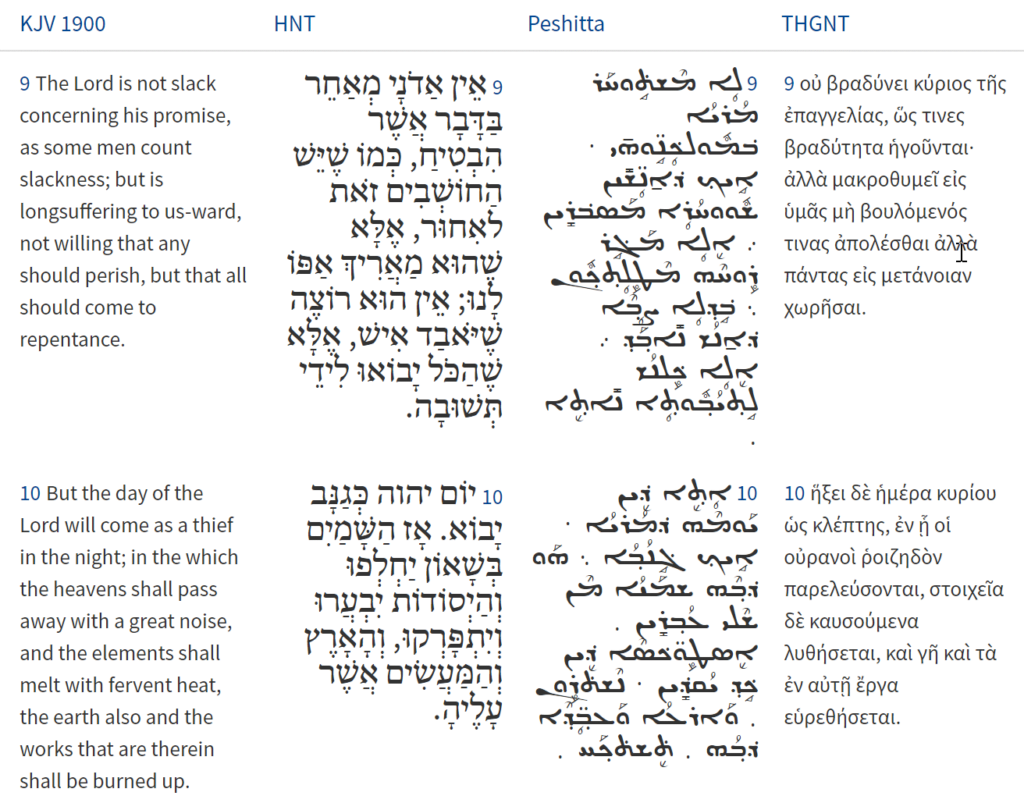
Here Peter writes אֵין אַדֹנָי מְאַחֵר בַּדָּבָר אֲשֶׁר הִבְטִיחַ which literally translates as “the Lord is not from behind the word that He promised” meaning that He is not slow or as the KJV writes “slack” on His promise. The Peshitta writes ܠܴܐ ܡܶܫܬܱ݁ܘܚܰܪ ܡܳܪܝܳܐ ܒ݁ܡܽܘܠܟܴ݁ܢܱ̈ܘܗ̄ܝ ܁ “does not tarry in His promises,” and the Greek text writes οὐ βραδύνει κύριος τῆς ἐπαγγελίας “the Lord does not delay His promise.” When one sins and nothing happens, or when the enemy continues in their wickedness and nothing happens, it might be assumed that the Lord God is slow on His promises. Peter goes on saying that God אֶלָּא שֶׁהוּא מַאֲרִיךְ אַפּוֹ לָנוּ that He is long suffering (מַאֲרִיךְ אַפּוֹ לָנוּ) which draws in the Torah perspective from Parashat Ki Tisa on Shemot / Exodus 34:6. The Peshitta writesܐܷܠܴܐ ܡܰܓܱ݁ܪ ܪܾܘܚܶܗ ܡܶܛܾܠܴܬ݂ܟ݂ܽܘܢ ܆ “but rather He is patient in spirit with you.” In 2 Peter 3:10 he writes concerning the coming day of the Lord, יוֹם יהוה כְּגַנָּב יָבוֹא (ܐܴܬ݂ܷܐ ܕܷ݁ܝܢ ܝܰܘܡܶܗ ܕ݁ܡܳܪܝܳܐ ܁ ܐܱܝܟ݂ ܓܱ݁ܢܳܒ݂ܳܐ) ܆ will be like the coming of a thief, at a time that is not known, and of the heavens passing away by the fire of judgment. This day of the Lord will result in “a reward to the righteous, and punishment to the wicked” and Peter speaks to the immediacy of judgment when it does come. We are being called to repent while, yet we have time, very similar to what Isaiah is writing according to the TgJ. We note the continuity here in the Scriptures from Isaiah and the NT text, and the reason why we should seek repentance daily in our lives! In Jewish thought we read according to Akeidat Yitzchak 104:1 how the nations again were given the opportunity to accept the Torah of God. Note again this was due to the Torah speaking of a mixed multitude of peoples being delivered from Egypt with Israel. In this example we have Ishmael and Edom. Ishmael was taught the Torah of God by Abraham and yet he dismissed the Torah of God and chose to marry from the daughters of the Land of Canaan and serve their gods. The rabbis say, “This act of voluntary submission made Israel into the ‘chosen people’ even though G’d had displayed fondness for other nations also.” We note that this submission is a humbling of heart by faith and is the pattern by which we are to approach the Lord, by faith and humbleness of heart. We also note how this is consistent with what we are reading according to the book of Isaiah. These nations, Babylon, Edom, Arabia, have their gods they worship, and the Lord God Almighty is trying to call out to them to turn from their sinful ways and turn to Him who is the author of Life and Truth! The Lord God Almighty is concerned with all men, regardless of nation or people. This again provides us with a future expectation of what we see in the Messiah of God, in Yeshua according to the NT text. Something to make note of is what the Lord God is revealing to us from the beginning, how deliverance, salvation, and entering into a covenant relationship with God come by faith. In the Torah and the Tanakh, the people did not enter into a covenant relationship with God by circumcision or by obedience to the Torah. Circumcision and Torah are for a people who love the Lord and are already in a covenant relationship with God by faith! It is the grace of God that draws all men to faith for the purpose of entering into a covenant relationship. Torah obedience comes as the fruit of the Spirit in the life of a believer. If we study these concepts at a fundamental level, all of these things are consistent and demonstrate the relevance of the Torah study for us today!
Isaiah goes on according to the TgJ saying the following, יג מַטַל כָס דִלוָט לְאַשקָאָה יָת עַרבָאֵי בְחוּרשָא בְרַמשָא יְבִיתוּן שְיָרַת בְנֵי דְדָן׃ 21:13 THE BURDEN OF THE CUP OF CURSING TO GIVE THE ARABIANS TO DRINK. In the forest, at even, the caravan of the sons of Dedan shall remain for the night. יד לְאַפֵי צָהְיָא פוּקוּ גִידוּנִין לְמַיָא דְיָתְבִין בַאְרַע דָרֹומָא מִמָא דְאַתוּן אָכְלִין זָמִינוּ לִמעָרְקַיָא׃ 21:14 Bring bottles of water before the thirsty, who dwell in land of the south; prepare for the fugitives the daily food which ye eat. (TgJ) Here Isaiah writes to the Arabians and how their sins lead to their drinking a cup of cursing. According to the Rabbis, the Torah speaks to being merciful to others, just as we see here in the Targum of the outcome of mercy through bringing drink to those who are fleeing, to show compassion. The Arabians according to Rashi however did not do this.
Rashi on Isaiah 21:14:1
לקראת צמא. דרך להביא מים ואתם יושבי ארץ תימא לא עשיתם כן אלא בלחמו קדמו נודד הביאו להם מיני מאכלים מלוחים ונודות נפוחים מלאי רוח והיה אוכל ומבקש לשתות ונותן פי הנוד לתוך פיו והרוח נכנס במעיו והוא מת, ד”א לקראת צמא התיו מים לא כן עשיתי לאביכם כשהיה צמא גליתי לו באר מים:
Toward the thirsty it is customary to bring water, but you, the inhabitants of the land of Tema, did not do so, but with his bread they came before the wanderer; they brought them sorts of salty foods and blown up flasks full of air, and he would eat and ask to drink, and he would put the opening of the flask into his mouth, and the air would go into his innards, and he would die. Another explanation of “Toward the thirsty they bring water,” is as follows: I did not do so to your forefather, Ishmael; when he was thirsty, I revealed to him a well of water.
Talmud Bavli Taanit 7a:13
Rabbi Ḥanina bar Pappa raised a contradiction. In one verse it is written: “To him who is thirsty bring water” (Isaiah 21:14), which indicates that the one who has water must bring it to the thirsty person, and it is written elsewhere: “Ho, everyone who thirsts, come for water” (Isaiah 55:1), from which it may be inferred that the thirsty person must seek out water himself. Rabbi Ḥanina bar Pappa resolves this apparent contradiction by explaining that if he is a worthy student the teacher must seek him out, as in “to him who is thirsty bring water,” but if the student is not worthy, then “Ho, everyone who thirsts, come for water,” i.e., this student must seek out a teacher himself.
According to Rashi, the Arabians did exactly the opposite of what is commanded, they brought salty food to those who were thirsty and empty flasks and thus those fleeing war would die. The Talmud Bavli Taanit 7a writes that Isaiah 21:14 indicates that the one who has water should bring water to those who are in need. There appears to be a parallel to the one who seeks, to the student who is to seek the refreshing waters of the Torah (Instruction of God). The rabbis say that this verse also speaks to the Teacher who seeks out the student who is thirsty for the Word of God. Yeshua also uses these Scriptures, from Isaiah 55:1 saying in John 7:37 Now on the last day, the great day of the feast, Jesus stood and cried out, saying, “If any man is thirsty, let him come to Me and drink.” (NASB) He spoke of Himself as being the source of life. We also remember how the Torah commands us to confess our sins and repent from them. Sin is transgression of the Torah’s commandments. The fact that sin remains is evidence that the Torah remains today, it has not passed away as some would claim! When we sin, we are not to remain in sin, nor are we to passively accept the fact that we are sinners. The LORD commands us to strive against sin. We must humble ourselves to confess the sin and then turn away from it. The Torah connects confession to repentance where confession is the humbling and admitting that we have disobeyed God’s word. We note the Torah consistency of John the Baptist where the people came to be “baptized by him in the Jordan River, confessing their sins” (Mark 1:5). Yeshua’s gospel message of the kingdom also comes with the significance of repentance. Most of Yeshua’s teachings also speak of the imperative to repent. We should recognize that according to the NT Text, the first step of obedience to Yeshua requires a confession and renunciation of sin. The life of discipleship requires daily confession and repentance.
The remainder of Isaiah 21 according to the TgJ states the following, טו אְרֵי מִן קֳדָם קִיטוּל עְרַקוּ מִן קֳדָם חְרַב שְלִיפָא וּמִן קֳדָם קַשַת מְתִיחָא וּמִן קֳדָם תְקֹוף קְרָבָא׃ 21:15 Because, on account of the slaughter they have fled: from the face of the drawn sword; and from the face of the bent bow; and from the face of the strength of the battle. טז אְרֵי כִדנָן אְמַר יוי לִי בְסֹוף שְנַיָא כִשנֵי אְגִירָא וִיסוּף כָל יְקָרְהֹון דעַרבָאֵי׃ 21:16 For thus hath the Lord said unto me: at the end of the years, as the years of an hireling, all the glory of the Arabians shall come to an end. יז וּשאָר תְקֹוף עָבְדֵי קְרָב גִיבָרֵי בְנֵי עַרבָאֵי יַזעְרוּן אְרֵי בְמֵימְרָא דַיוי אְלָהָא דְיִשׂרָאֵל גְזִיר כֵין׃ 21:17 And the strength of the warriors, the mighty, the sons of the Arabians, shall be lessened, because by the WORD of the Lord, the God of Israel, it is thus decreed. (TgJ) Here the people are wandering about in Arabia due to the fleeing from the king of Assyria. (Ibn Ezra on Isaiah 21:15 Part 1) Rashi writes the following concerning Isaiah 21:15.
Rashi on Isaiah 21,15 Part 1-2
כי מפני חרבות נדדו. עמי: Since because of the swords they wandered (I.e.,) my people (wandered).
וחרב נטושה. פשוטה על פני הארץ כמו (שמואל א ל׳:ט״ז) והנם נטושים על פני כל הארץ (שם כה) וינטשו בעמק רפאים ד”א נטושה כמו לטושה כל אותיות אשר מוצאיהם קרובים להיות ממקום אחד מתחלפות זו בזו נו”ן בלמ”ד כענין שנא’ (נחמיה י״ג:ז׳) לעשות לו נשכה כמו לשכה: the outstretched sword (נְטוּשָׁה), spread over the surface of the earth, as (I Sam. 30:16) “And behold, they were scattered (נְטוּשִׁים) over the entire landscape,” (II Sam. 5: 18) “And spread out (וַיִּנָּטְשׁוּ) in the Valley of Rephaim.” Another explanation is that נְטוּשָׁה is like לְטוּשָׁה, sharp. All letters whose sources are close to being from one place, (i.e., from one speech organ,) are interchangeable with one another, the ‘nun’ with the ‘lamed,’ as in the case stated (in Nehemiah 13: 7): “To make him a chamber (נִשְׁכָּה),” like לִשְׁכָּה.
Here Rashi discusses how the have the sword is נְטוּשָׁה “outstretched” over the surface of the earth. The people flee because their gods are unable to save them! A significant point here is to what other religion deals with the issues of sin and redemption? Isaiah is speaking of the unrepentant sins of the nation’s leading to their destruction. There are no other religions that can be compared to the testimony of God in the Scriptures, to the Mitzvot (commandments) and defines sin as we see God doing according to His Torah! This illustrates why confession is so important in the life of God’s people. We note again the consistency of this with James 5:19-20.
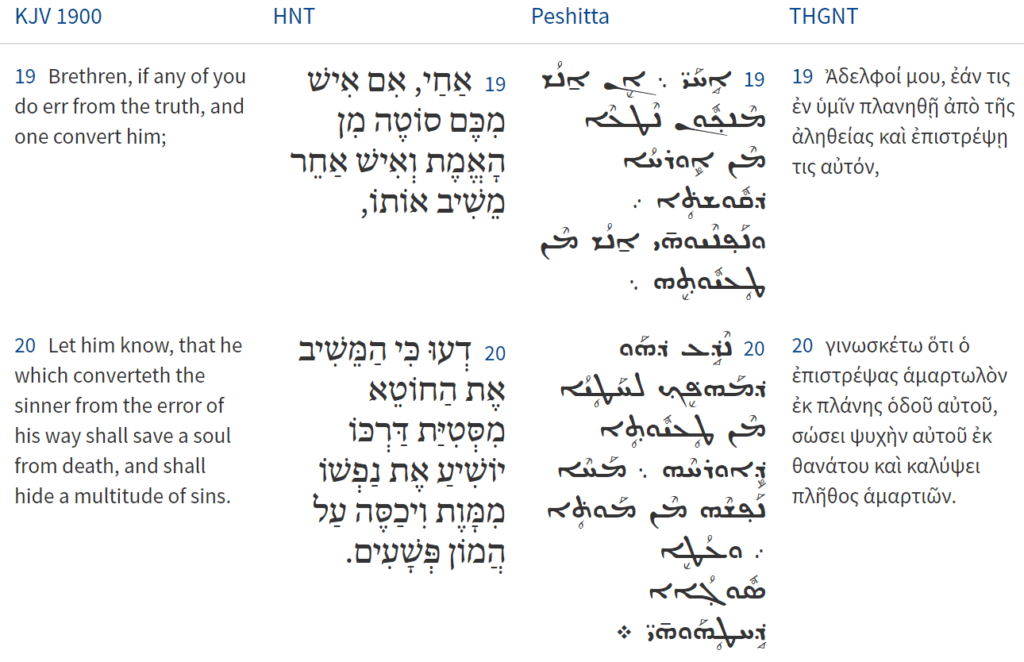
The idea of conversion is found here in the words אַחַי, אִם אִישׁ מִכֶּם סוֹטֶה מִן הָאֱמֶת וְאִישׁ אַחֵר מֵשִׁיב אוֹתוֹ “brothers, if a man from you errors from the truth, and one man convert him” here the keyword is מֵשִׁיב taken from the root word “shuv” שוב meaning to turn. The Greek text stats ἐπιστρέψῃ τις αὐτόν saying essentially the same thing, to turn him back. The Peshitta writes ܘܢܰܦ݂ܢܶܝܘܗ̄ܝ ܐ̱ܢܳܫ ܡܶܢ ܛܴܥܝܽܘܬ݂ܷܗ “to turn a man from error.” This is the idea of converting (turning, ܘܢܰܦ݂ܢܶܝܘܗ̄ܝ, מֵשִׁיב, ἐπιστρέψῃ), where one turns from his sinful ways and walks in the way of God once more. We note this is the idea of the disciples of Yeshua continuing to carry out the commandments of God according to the Torah and confess their sins before God. (James 5:16) Remember how sin is defined by disobedience to the Commands of God. We note that this is why the Torah has not passed away. We also note that according to 1 John 1:7 the importance of walking in righteousness.
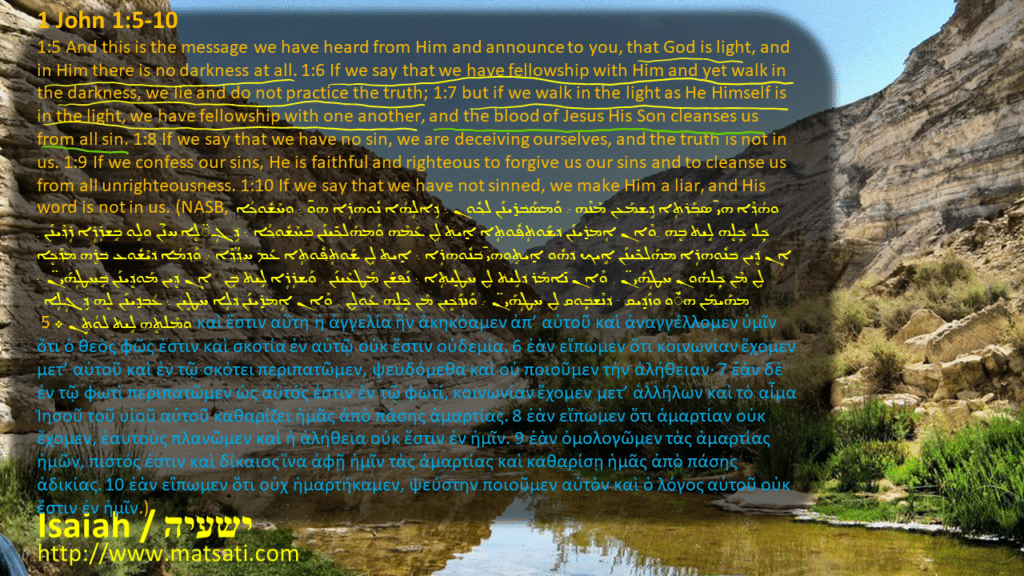
1 John 1:5-10
1:5 And this is the message we have heard from Him and announce to you, that God is light, and in Him there is no darkness at all. 1:6 If we say that we have fellowship with Him and yet walk in the darkness, we lie and do not practice the truth; 1:7 but if we walk in the light as He Himself is in the light, we have fellowship with one another, and the blood of Jesus His Son cleanses us from all sin. 1:8 If we say that we have no sin, we are deceiving ourselves, and the truth is not in us. 1:9 If we confess our sins, He is faithful and righteous to forgive us our sins and to cleanse us from all unrighteousness. 1:10 If we say that we have not sinned, we make Him a liar, and His word is not in us. (NASB, ܘܗܳܕ݂ܶܐ ܗ̄ܝ ܣܒ݂ܰܪܬ݂ܴܐ ܕܱ݁ܫܡܰܥܢ ܡܶܢܶܗ ܇ ܘܰܡܣܰܒ݁ܪܻܝܢܰܢ ܠܟ݂ܽܘܢ ܆ ܕܱ݁ܐܠܴܗܳܐ ܢܽܘܗܪܴܐ ܗ̄ܘ ܆ ܘܚܶܫܽܘܟ݂ܳܐ ܟܾ݁ܠ ܟܾ݁ܠܷܗ ܠܱܝܬ݁ ܒܷ݁ܗ ܂ܘܶܐܢ ܐܴܡܪܻܝܢܰܢ ܕ݁ܫܰܘܬܴ݁ܦ݂ܽܘܬ݂ܴܐ ܐܻܝܬ݂ ܠܱܢ ܥܰܡܶܗ ܘܰܡܗܰܠܟ݂ܺܝܢܰܢ ܒ݁ܚܶܫܽܘܟ݂ܳܐ ܆ ܕܱ݁ܓܴ̈݁ܠܷܐ ܚ̄ܢܰܢ ܘܠܱܘ ܒܱ݁ܫܪܴܪܴܐ ܪܴܕ݂ܶܝܢܰܢ ܂ ܐܷܢ ܕܷ݁ܝܢ ܒ݁ܢܽܘܗܪܴܐ ܡܗܰܠܟ݂ܺܝܢܰܢ ܐܱܝܟ݂ ܕ݁ܗܽܘ ܐܻܝܬ݂ܱܘܗ̄ܝ ܒ݁ܢܽܘܗܪܴܐ ܆ ܐܻܝܬ݂ ܠܱܢ ܫܰܘܬܴ݁ܦ݂ܽܘܬ݂ܴܐ ܥܰܡ ܚ̈ܕ݂ܳܕ݂ܶܐ ܇ ܘܰܕ݂ܡܳܐ ܕ݁ܝܶܫܽܘܥ ܒ݁ܪܷܗ ܡܕ݂ܰܟܷ݁ܐ ܠܱܢ ܡܶܢ ܟܾ݁ܠܗܽܘܢ ܚܛܴܗܰܝ̈ܢ ܂ ܘܶܐܢ ܢܺܐܡܰܪ ܕ݁ܠܱܝܬ݁ ܠܱܢ ܚܛܻܝܬ݂ܴܐ ܆ ܢܰܦ݂ܫܰܢ ܡܰܛܥܶܝܢܰܢ ܂ ܘܰܫܪܴܪܴܐ ܠܱܝܬ݁ ܒܱ݁ܢ ܂ ܐܷܢ ܕܷ݁ܝܢ ܡܰܘܕܷ݁ܝܢܰܢ ܒܱ݁ܚܛܴܗܰܝ̈ܢ ܆ ܡܗܰܝܡܰܢ ܗ̄ܽܘ ܘܙܰܕܻ݁ܝܩ ܁ ܕ݁ܢܶܫܒܾ݁ܘܩ ܠܱܢ ܚܛܴܗܰܝ̈ܢ ܇ ܘܰܢܕ݂ܰܟܷ݁ܝܢ ܡܶܢ ܟܾ݁ܠܷܗ ܥܰܘܠܱܢ ܂ ܘܶܐܢ ܐܴܡܪܻܝܢܰܢ ܕ݁ܠܴܐ ܚܛܱܝܢ ܆ ܥܳܒ݂ܕܻ݁ܝܢܰܢ ܠܷܗ ܕܱ݁ܓܴ݁ܠܴܐ ܂ ܘܡܶܠܬ݂ܷܗ ܠܱܝܬ݁ ܠܘܳܬ݂ܱܢ ܀ 5 καὶ ἔστιν αὕτη ἡ ἀγγελία ἣν ἀκηκόαμεν ἀπʼ αὐτοῦ καὶ ἀναγγέλλομεν ὑμῖν ὅτι ὁ θεὸς φῶς ἐστιν καὶ σκοτία ἐν αὐτῷ οὐκ ἔστιν οὐδεμία. 6 ἐὰν εἴπωμεν ὅτι κοινωνίαν ἔχομεν μετʼ αὐτοῦ καὶ ἐν τῷ σκότει περιπατῶμεν, ψευδόμεθα καὶ οὐ ποιοῦμεν τὴν ἀλήθειαν· 7 ἐὰν δὲ ἐν τῷ φωτὶ περιπατῶμεν ὡς αὐτός ἐστιν ἐν τῷ φωτί, κοινωνίαν ἔχομεν μετʼ ἀλλήλων καὶ τὸ αἷμα Ἰησοῦ τοῦ υἱοῦ αὐτοῦ καθαρίζει ἡμᾶς ἀπὸ πάσης ἁμαρτίας. 8 ἐὰν εἴπωμεν ὅτι ἁμαρτίαν οὐκ ἔχομεν, ἑαυτοὺς πλανῶμεν καὶ ἡ ἀλήθεια οὐκ ἔστιν ἐν ἡμῖν. 9 ἐὰν ὁμολογῶμεν τὰς ἁμαρτίας ἡμῶν, πιστός ἐστιν καὶ δίκαιος ἵνα ἀφῇ ἡμῖν τὰς ἁμαρτίας καὶ καθαρίσῃ ἡμᾶς ἀπὸ πάσης ἀδικίας. 10 ἐὰν εἴπωμεν ὅτι οὐχ ἡμαρτήκαμεν, ψεύστην ποιοῦμεν αὐτὸν καὶ ὁ λόγος αὐτοῦ οὐκ ἔστιν ἐν ἡμῖν.)
We note that John 1:7 states that if we walk in the light, this refers to our striving for righteousness and turning from sin. When we are striving for this, the blood of Yeshua cleanses us from all sin. But if we are not striving for righteousness, and are ok with our sins, and not repenting, the blood of Yeshua does not atone. We note how important it is to recognize this and not fall into the group of people we read about in Matthew 7. When we are striving for the righteousness of God, seeking His mercy and forgiveness, confessing our sins, then the efficacious sacrifice of our righteous Messiah atones for our sins, and our prayers of confession and repentance will always be received, just as Paul wrote saying, “He made you alive together with Him, having forgiven us all our transgressions” (Colossians 2:13).
